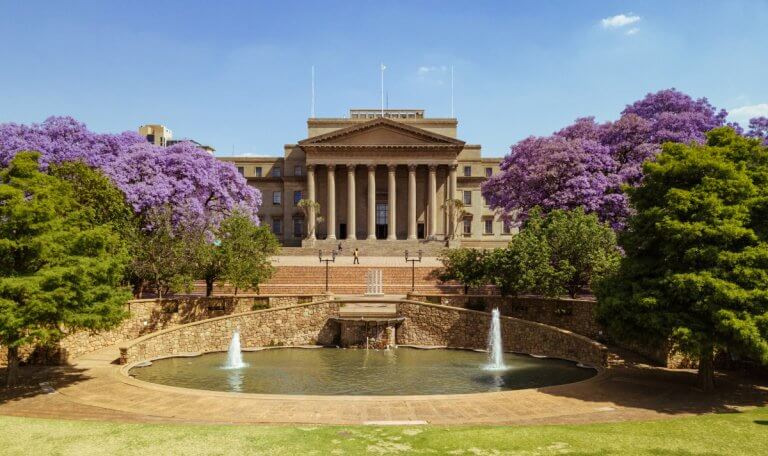
Many students across the world dream of “making a difference”. However, they often lack the support, skills and resources to do so during their university years, and that dream has already faded by the time they come to graduate.
At the University of the Witwatersrand (Wits) in Johannesburg, South Africa, students have multiple opportunities to making a difference in their future.
The University is a hub of knowledge production across disciplines and borders, offering them the chance to develop interdisciplinary skills while providing access to quality higher education.
Specialist training and knowledge in their respective programmes give students a well-rounded skillset and knowledge base, creating globally-aware graduates so they can become international change-makers.
Multidisciplinary approach
The University offers multiple opportunities for students to get involved in multidisciplinary programmes, standing as an exemplary representative of South African education.

Source: University of the Witwatersrand
For example, back in 2016, the Department of Science and Technology (DST) identified the need to establish a multi-institutional National e-Science Postgraduate Teaching and Training Platform (NEPTTP).
The platform is meant to develop human capital with the knowledge needed to conduct cutting-edge research in e-Science.
The DST is comprised of six universities, providing funding for the platform, where Wits serves as the hub.
The platform was officially launched in 2017, and the first cohort of approximately 30 students enrolled for the Master of Science in e-Science and the Master of Arts in e-Science degrees in 2018.
What’s unique about these programmes is that students are from different disciplines such as Computer Science, Mathematics, Applied Mathematics, Actuarial Sciences, Physics, Social Sciences and Public Health.
Currently, the NEPTTP is in discussion with various public and private partners like the Gauteng Department of e-Government and the Gauteng Department of Health, as well as financial institutions, and international partners to facilitate an internship programme for graduating students.
Turgay Celik, NEPTTP Director and Professor at the School of Computer Science and Applied Mathematics at Wits, said, “We foresee the demand for such degrees increasing exponentially over the next few years.”
Catalyst for social change
As a gateway to knowledge and understanding in Africa, Wits consistently produces top-ranked, world-class research and collaboration across borders and cultures that truly make a difference.
The studies and partnerships at this University are at the forefront of cutting-edge research, exploring new topics and emerging technologies.
For example, researchers here are finding more unique and interesting ways to employ technology and AI in the workplace, as well as to improve people’s lives and well-being, which is a trending globally.

Dr Benjamin Rosman. Source: University of the Witwatersrand
In 2017, a Wits robotics researcher was awarded Africa’s only grant in the 2017 round of the Google Faculty Research Awards. Dr Benjamin Rosman, Senior Lecturer in the Wits School of Computer Science and Applied Mathematics and a researcher in robotics, artificial intelligence, decision theory and machine learning, was granted the award in the Machine Learning and Data Mining category.
This made Rosman and Wits University the only African researcher and university among the recipients.
Meanwhile, at the Faculty of Health Sciences, researchers have found ways to control a robotic arm with the brain, or a wheelchair by using eye movement.
According to this article, “They have also used the Vestibulo-Occular Reflex (an impulse our eyes use daily unbeknownst to us that fixates our vision while we move our head) to control the mouse cursor on a computer game.”
Impact on health
Wits-associated scientists are also part of an international team that recently published research suggesting a cure for HIV.

Annemarie Wensing. Source: University of the Witwatersrand
Annemarie Wensing is an Honorary Professor at the Wits Reproductive Health and HIV Institute (RHI), and Professor Monique Nijhuis is an Honorary Professor in the HIV Pathogenesis Research Unit (HPRU) in the Faculty of Health Sciences at Wits.
Both scientists hold primary appointments at the University Medical Center Utrecht in the Netherlands.
Professor Francois Venter, Deputy Executive Director, Wits RHI, said, “Wits’ collaboration with Utrecht has been a delight and we have the combined expertise of Wits and Utrecht to do innovative work and conduct translational research that is published in top medical journals.”
Under the Strategic Health Innovation Partnerships (SHIP) grant for HIV Cure, the scientists aim to “identify the latent HIV reservoir in various body compartments and research the anatomical location and composition of the viral reservoir.”
All these are exciting examples of research at Wits, all of which students can learn from and gain insights that give them a head start in their future careers.
Want to change the world? Join team Wits today!
Follow Wits on Facebook, Twitter, YouTube and LinkedIn
Liked this? Then you’ll love…
Wits: Transforming students into public leaders of tomorrow
The University of Witwatersrand breathes innovation into Johannesburg







